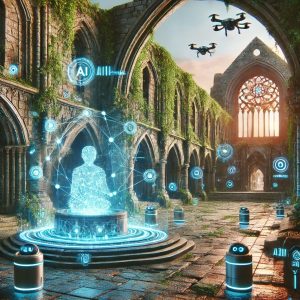Let’s start with the basics, what’s Artificial intelligence?
It is a type of computer technology which is concerned with making machines work in an intelligent way, similar to the way that the human mind works (think and learn). In general use, “artificial intelligence” means a machine which mimics human cognition, such as word for the thought process. This process is the way we think. Some of the things we associate with other minds, such as learning, problem solving and logical thinking, can be done by computers, or better said robots or self-driving cars. The abbreviation AI is also used.
Intelligent machines will probably replace the entire human workforce.
Therefore some people also consider AI a danger to humanity if it progresses unabatedly. According to Stephen Hawking, artificial Intelligence and its possible implementations need to be managed with the utmost care in order to prevent its power from falling into the wrong hands or being used in a way that does not benefit mankind as a whole. The renowned physicist stressed the point that AI could be used to commit deplorable acts in the form of powerful autonomous weapons and other ways in which people in power could use the technology to oppress and control a majority of the population. Hawking even went so far as to suggest that the creation of AI could potentially end up being the last accomplishment of mankind if we do not learn to understand the risks associated with it. However, he also believes that the technology could be extremely beneficial to the world and could be used to stop the spread of disease and poverty.
“The potential benefits of creating intelligence are huge… With the tools of this new technological revolution, we will be able to undo some of the damage done to the natural world by the last one — industrialization. And surely we will aim to fully eradicate disease and poverty. Every aspect of our lives will be transformed.
In short, success in creating AI, could be the biggest event in the history of our civilization. But it could also be the last, unless we learn how to avoid the risks. Alongside the benefits, AI will also bring dangers, like powerful autonomous weapons, or new ways for the few to oppress the many. It will bring great disruption to our economy”.
Stephen Hawking
But enough about decimation and total destruction. Before panicking about the impending machine-led apocalypse, let’s take a look at how general intelligence technology can be developed and put to productive use. It’s likely that the increasing availability and decreasing cost of technology will lead to the cheap mass production of machines capable of doing jobs that currently require the hands and mind of a human. This means that machines will not only replace the entire human workforce but will also be easily replaceable.
Whole Brain Emulation worker or WBE is a proposed technique which involves transferring the information contained within a brain onto a computing substrate / intelligent computer. The brain can then be simulated, creating a machine intelligence. The concept is often discussed in context of scanning the brain of a person, known as mind uploading. For instance, if a WBE worker needs a break, just like a real human would, it can simply be replaced with a fresh unit and no productive time needs to be sacrificed. In fact, it would be easy to do this by programing a template WBE that thinks it just got back from vacation. This template could then be used to make infinite copies of new workers. But clearly this amounts to mechanical slavery and raises important moral issues. For example, if a machine became aware that it would die at the end of the day, we could simply program it to embrace death. But is that ethical? Should these artificial employees be treated like sentient beings or inert tools?
Work isn’t the only thing that Super Intelligence (SI) machines could take over; they could also be in charge of various mundane tasks in our personal lives. As the minds of these machines come increasingly closer to resembling those of human beings, we could use them to optimize our lives; for instance, we could design a digital program that verbally articulates our thoughts or that achieves our personal goals better than we could alone. The result of such advances would mean a human existence that is largely automated, low-risk, devoid of adventure and, frankly, too perfect. And where would that leave us? How would we occupy ourselves in such a future?
It’s clear that an entirely robotic workforce would completely transform the economy, as well as our lifestyles and desires; as machine labor becomes the new, cheaper norm, the pay of workers will drop so low that no human will be able to live off a paycheck. Also, the few employers of the mechanical workforce would accrue a lot of money. But this brings us back to an earlier point, because where that money ends up also depends on whether SI (super intelligent) is designed by a single exclusive group or is the result of a slow collaborative process. If the former turns out to be true, most people would be left with few options for income generation, likely renting housing to other humans or relying on their life-savings and pensions.
And the people who don’t have property or savings? They would be destitute. Their only options would be to use their remaining money to upload themselves into a digital life form, if such technology exists, or rely on charity from the hyper-wealthy.
And the rich?
They’ll lose interest in what we today consider highly desirable luxuries. That’s because with machines doing all the work, anything made or offered by a human will become a highly-valued rarity, much like artisanal products are in our time. While today it might be wine or cheese, in the future it could be something as simple as a handmade key chain.
But the new mode of production would also make possible an unimaginable variety of technological products – maybe even the ability to live forever or regain youth. So instead of buying yachts and private islands, the wealthy might use their money to upload themselves into digital brains or virtually indestructible humanoid bodies.
However, this scenario assumes that the super intelligent worker robots will not rebel and try to destroy human society. Therefore, whatever route we follow with SI, safety will always be key.
I can see myself in a self driving car such as Tesla:) but you all already know, I’m a TESLA freak!
Share your thoughts about the Future, by leaving a comment.
View this post on InstagramA post shared by Soo-Me (@soo_me_social) on
Love, Marietta


